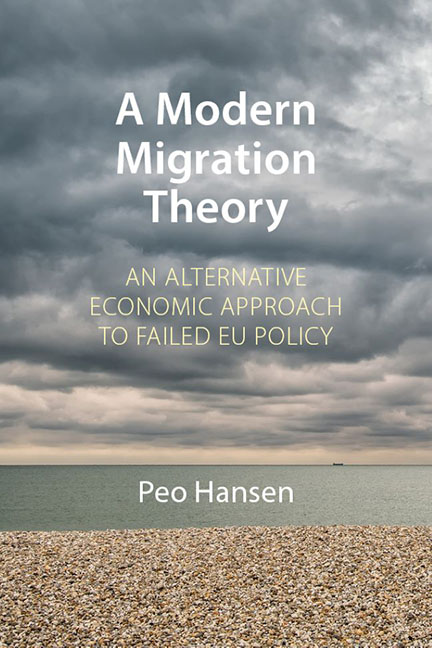Book contents
- Frontmatter
- Dedication
- Contents
- Preface and acknowledgements
- Foreword
- 1 Migration: the “mother of all problems”
- 2 The fiscal impact of migration
- 3 A modern migration theory
- 4 Demography, security and the shifting conjunctures of the European Union’s external labour migration policy
- 5 Labour migration in a sound finance policy logic
- 6 Why EU asylum policy cannot afford to pay demographic dividends
- 7 “We need these people”: refugee spending, fiscal impact and refugees’ real bearing on Sweden’s society and economy
- 8 Conclusion
- Bibliography
- Index
1 - Migration: the “mother of all problems”
Published online by Cambridge University Press: 20 December 2023
- Frontmatter
- Dedication
- Contents
- Preface and acknowledgements
- Foreword
- 1 Migration: the “mother of all problems”
- 2 The fiscal impact of migration
- 3 A modern migration theory
- 4 Demography, security and the shifting conjunctures of the European Union’s external labour migration policy
- 5 Labour migration in a sound finance policy logic
- 6 Why EU asylum policy cannot afford to pay demographic dividends
- 7 “We need these people”: refugee spending, fiscal impact and refugees’ real bearing on Sweden’s society and economy
- 8 Conclusion
- Bibliography
- Index
Summary
In a European survey conducted by the French think tank Fondapol in 2017, respondents were asked to consider the following statement: “It is our duty to welcome in our country refugees fleeing war and poverty.” Sixty-four per cent of those surveyed “agreed with or strongly agreed with” this statement. Given the anti-immigration climate following in the wake of the 2015 Syrian refugee crisis, this should strike the reader as surprisingly high. But the survey also included another statement: “We cannot let in more refugees because that would harm the country's economy.” Curiously, 61 per cent of the survey respondents also “agreed with or strongly agreed with” this statement (Fondapol 2017).
In this book, I argue that we must come to terms with this contradiction if we are to gain a proper understanding of the so-called refugee crisis in 2015– 16 and the persistence of the migration issue's political explosiveness in Europe. For one, it seems safe to say that the future existence of international protection in the European Union will come to hinge on the resolution of what we may call a clash of moral and fiscal imperatives. That is to say, although many people still think that we have a moral duty to protect “refugees fleeing war and poverty”, the majority are also convinced that society cannot afford to realize this duty. Were we to leave out the part about refugees “harm[ing] the country's economy” and instead simply ask people whether they agree or disagree with a statement such as “Refugees and refugee reception constitute a net cost, at least in the short term”, then I am certain that close to 100 per cent of respondents would agree.
The reason I feel confident of such an outcome is that practically all politicians, news media outlets and scholars subscribe to the view that refugees constitute a net cost or a fiscal burden. This does not mean that they necessarily have anything against refugees or migration in general. It just means that they are all convinced that certain types of migrants weigh on the public purse, at least initially.
- Type
- Chapter
- Information
- A Modern Migration TheoryAn Alternative Economic Approach to Failed EU Policy, pp. 1 - 22Publisher: Agenda PublishingPrint publication year: 2021

